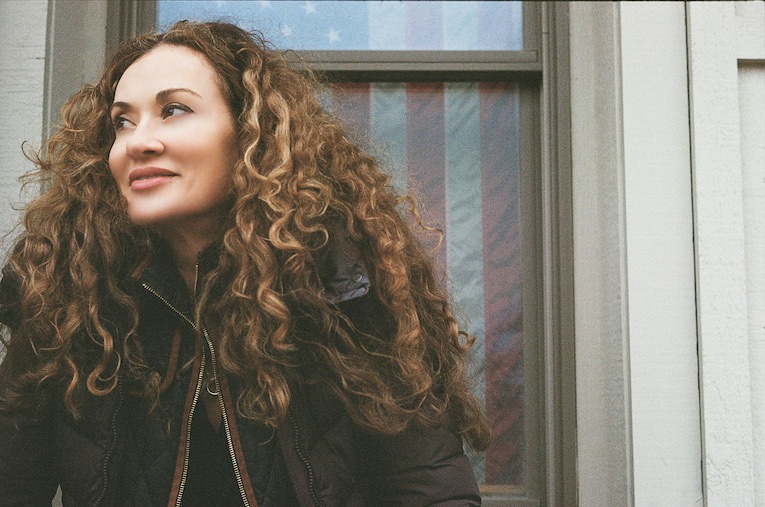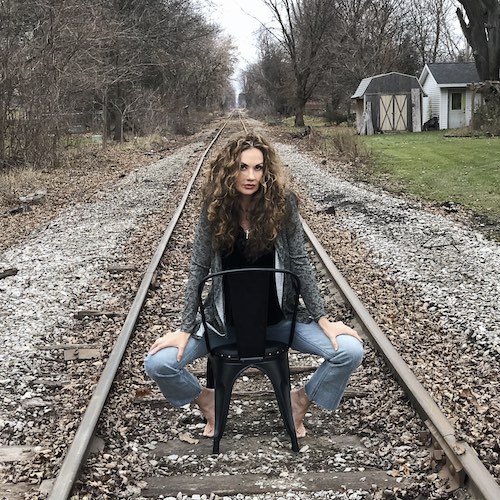
Photo: Dana Fuchs by Bobby Harlow
By Martine Ehrenclou
Critically acclaimed songwriter and vocalist Dana Fuchs is one of the fiercest voices in modern day roots music, a blues/rock belter with plenty of soul. With her recent past albums Bliss Avenue and Love Lives On, she created groove-laden soul that served as her story-telling salve about growing up in rural Florida with her family’s struggle with addiction and mental illness.
With her newest project, Borrowed Time, Fuchs digs deep into her Southern rock upbringing, saluting the loud-guitar-driven sounds that tracked her childhood years in rural Wildwood, FL.
Fuchs grew up on The Beatles, The Rolling Stones, Led Zeppelin and Lynyrd Skynyrd, music that offered her a view of a world outside of the 2000-person town she was raised in. Along with bandmates bassist Jack Daley and guitarist Jon Diamond who had had taken Fuchs under his wing during her early days in New York City and co-produced her first four albums, Fuchs headed to Michigan to record the album. There she was joined by guitarist and recording engineer Kenny Tudrick (The Detroit Cobras), drummer Todd Glass and keyboardist Jordan Champion, and the group recorded Borrowed Time in eight days. Her newest album finds Fuchs merging into new territory, southern rock and rock & roll. It’s a genre that suits this talented songstress well.
A singer whose voice and presence led critics to compare her to Janis Joplin, Otis Redding and Mick Jagger, Fuchs was cast as the lead in the hit musical ‘Love, Janice’ and starred as Sadie in ‘Across the Universe’, a Best Picture nominee by the Golden Globe Awards.
I asked Dana Fuchs about her foray into Southern rock and about her new album Borrowed Time, out April 29th via Ruf Records.
Dana said, “I really felt like with this album, I wanted to get out into the world a little more. My last few albums came from a lot of personal stories of family, my struggles, my family’s struggles. And then of course, meeting people along the way when I tell my story. It felt internal. I wanted to go out further into the world.”
During the COVID shutdown, Fuchs went back to college to finish her degree and undertook more theater classes and an independent study with a sociology professor. It was there she mined stories for new songs from studying plays and reports based in Liberia, Nigeria, and Cape Town, South Africa.
“For instance,” Fuchs said, “‘Nothing You Own’ is based on a woman in South Africa who was starving and couldn’t take care of her family. There’s so much beauty in humanity and so much suffering, and the two will always go hand in hand. That’s kind of what the album is about and that we’re all on borrowed time and we can either make the best of it or have anxiety over the fact that we’re on borrowed time, which very easy to do.”
“How did you get into Southern rock and rock & roll for Borrowed Time?” I asked.
Dana shared, “It was so fun. I got to tell you, it was the most fun and rewarding experience I ever had. I kept saying the whole time we were recording, ‘Guys, I don’t care if nobody likes this album. I am having a fucking great time making it.’ That was the attitude. It was so loose and carefree for the first time and so fun. And you know, I’m a Southern rock girl. I grew up in Florida near the tip of the panhandle, so Lynyrd Skynyrd was a big staple in our house. I’m also a big Rolling Stones fan and they really leaned on Southern rock and blues, too.

“Our label suggested a couple of producers,” Dana said. “There was this one guy in Michigan, Bobby Harlow. We scheduled a call with him after sending him the demo. He came out of the gate and said, ‘Guys, I’m hearing these songs and I’m thinking, I want to hear Dana go Southern rock.’ And I literally texted everybody on the call except him, saying, ‘This is the guy– he’s hired.’”
“You went back to the music that you truly loved from growing up?” I asked.
Bubbly, Dana said, “Yes, yes! Stones. Skynyrd. It was so much fun. We flew into Michigan the night before Thanksgiving (to record the album), which was a whole funny story in and of itself. I’m like, ‘All right, I’m going to turn it into like a little family vacation.’ It’s the first album that all I have to do is show up and sing. I’ve turned it all over to a producer to take care of the music and the scheduling, all the budgeting. We got this Airbnb. I wrote the host and I said, ‘Will anything be open on Thanksgiving? We’re going to come the night before if there is.’ And she’s like, ‘You’re going to be in Lexington. Everything’s open.’ She just thought I met in general. But nothing was open. We were starving. One little deli was open and we bought cans of tomato sauce, some macaroni noodles. They fortunately had wine and we had a great day. The next day we loaded in and started.”
With so many interesting songs on Borrowed Time, we discussed a couple of them. Curious about her track “Star,” I asked her about it.
“I got to give it up to Jon Diamond, the guitarist,” Dana said. “He’s the one I write all the songs with. He just had this nasty riff. It reminded me a little bit of a Lenny Kravitz tune, then Aerosmith. I was like, ‘But what’s the lyric going to be?’ All we had was a riff. I just started seeing life on the road and lot of musicians that I knew back in the day of heavy, heavy touring who were a bit older. The road life is hard. Drugs and alcohol, just to cope. There was one in particular, who I won’t name, but just always the nicest human in the world, always dressed in stage costume. Even if you’re flying on a 10-hour overnight flight, always with a ring on every finger, the suit, getting loaded on the plane, but such a nice human being. A really tortured soul, but looked like a fucking superstar. That was one of the images in my mind.”
Dana continued. “It’s the tragic aspect of life on the road, the unhealthy aspect because it can be so grueling. Then you get home after six weeks out and you’re like looking at the pictures, having the memories and you only remember the good stuff. That’s what ‘Star’ is about. And it just needed to be a nasty rock and roll song.”
“What’s life on the road like for you?” I asked.
“Pre-children, I learned very quickly that for me and the kind of singing I’m doing, when you’re performing five nights in a row with maybe one day off, there’s no partying all night,” Dana said. “You have to live like a nun or an athlete. It was a grind, but it really is what deepened my Buddhist practice. I’ve been part of this Buddhist center for 15 years now and it requires a commitment of going to classes twice a week. When I was on the road, they would send you a copy of the class and you had to listen to it. I would do that in the plane or on the bus or van.”
Dana explained that she got deeply into meditating while on the road and that it kept her sane. “And that really changed the show for me too, because it was like, ‘Why am I here? Not just to get a paycheck. There’s people showing up wanting a little respite from their fucking life. That’s my job to give them that respite.’ You really need all the energy you can to give an audience what they come for and what they deserve for buying a ticket, leaving their house and showing up.”
“Is there more to your performing than giving people a respite? Is there joy for you?”
Dana zeroed in on what it’s like to be an artist, a performer. “The joy only came when I changed the focus to the audience. When I first started touring, it was like, ‘How do I look? How do I sound? How many people came to my show? Am I selling records?’ I had this competition with myself going on. It was very stressful. I was like, ‘I don’t want to be tense on stage. I don’t want to feel like I have to prove something.’ And then I realized the audience isn’t expecting me to prove anything. They just came to see a show. That’s really when the show and touring changed for me– it became about that shared experience with the audience every night. That’s the only reason I’ve been able to do it this long.”
I asked, “Was that a conscious decision or a spiritual transformation?”
Dana said, “It was actually both because I had to make the conscious decision that I don’t want to feel like this on stage, especially in those early days when you didn’t know your sound guy and terrible monitors and afterwards you thought you sang your heart out, even though you struggled because the monitor sound was awful. And then somebody from the audience would say, ‘Were you sick tonight? I couldn’t hear you.’ Oh, it was so brutal. And I would take it all so personally. It was really deciding that I either have to get out or I have to find a different way in. So, it was a conscious decision to find that different way in.”
Listen to “Hard Road” by Dana Fuchs
For more information on Dana Fuchs see her website here.

Great that Dana has gone back to her roots. Her spiritualism and hard work is to be admired and is evident on this project.
Can’t wait to hear more from this talented lady!
Dana is one of the reasons I still volunteer at my theatre. Didn’t know of her before then. Seeing her isn’t just a show, it’s more like an experience.
Huh
So Dana is a nun with a degree and cans of tomatoe beans now !!!!
Noooo.
Wooow.
Inspiring story and reading.
It’s a hard road for sure.
Thank’s for focusing on that and make us all think twice. This was really mature stuff and it seems Dana reached a higher level. Deeper level.
Hard Road video and title is awesome.
Gonna be my « mantra» for awhile.
That’s for sure. Love the southern touch. That voice and those guitars.
Can you feel it. Strength. Believe and belief.
Oh , man.
Can’t wait til next live concert.
Way to go. Go get em.
GArp
Not sure if Dana is truly rock-n-roll there’s a hard edge missing to make it really rock. It passes in blues and sort of passes as rock but neither one truly hit center. Her earlier stuff is way better cause I believe her voice and style has matured…